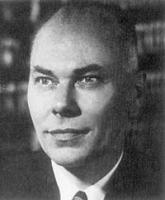| www.tmatlantic.com
Test & Soldering Equipment On-line Store |
|
D.E.V.I.C.E. (Wiki)Calculators Services |
|||||
Filter by first letter
|
Aiken, Howard Hathaway
Howard Hathaway Aiken (March 8, 1900 – March 14, 1973) was a pioneer in computing, being the original conceptual designer behind IBM's Harvard Mark I computer. Aiken studied at the University of Wisconsin–Madison and later obtained his PhD in physics at Harvard University in 1939. During this time, he encountered differential equations that he could only solve numerically. He envisioned an electro-mechanical computing device that could do much of the tedious work for him. This computer was originally called the ASCC (Automatic Sequence Controlled Calculator) and later renamed Harvard Mark I. With engineering, construction, and funding from IBM, the machine was completed and installed at Harvard in February, 1944. Grace Hopper joined the project in July of that year. In 1947, Aiken completed his work on the Harvard Mark II computer. He continued his work on the Mark III and the Harvard Mark IV. The Mark III used some electronic components and the Mark IV was all-electronic. The Mark III and Mark IV used magnetic drum memory and the Mark IV also had magnetic core memory.
Aiken was inspired by Charles Babbage's difference engine.
Aiken accumulated honorary degrees at the University of Wisconsin, Wayne State and Technische Hochschule, Darmstadt. He was elected a Fellow of the American Academy of Arts and Sciences in 1947. He received the University of Wisconsin–Madison College of Engineering Engineers Day Award in 1958, the Harry H. Goode Memorial Award in 1964, the John Price Wetherill Medal in 1964, and the IEEE (Institute of Electrical and Electronics Engineers) Edison Medal in 1970 "For a meritorious career of pioneering contributions to the development and application of large-scale digital computers and important contributions to education in the digital computer field."
In addition to his work on the Mark series, another important contribution of Aiken's was the introduction of a master's program for computer science at Harvard in 1947, nearly a decade before the programs began to appear in other universities. This became a starting ground to future computer scientists, many of whom did doctoral dissertations under Aiken. |
|
Site mapPrivacy policyTerms of Use & Store PoliciesHow to BuyShippingPayment |

























